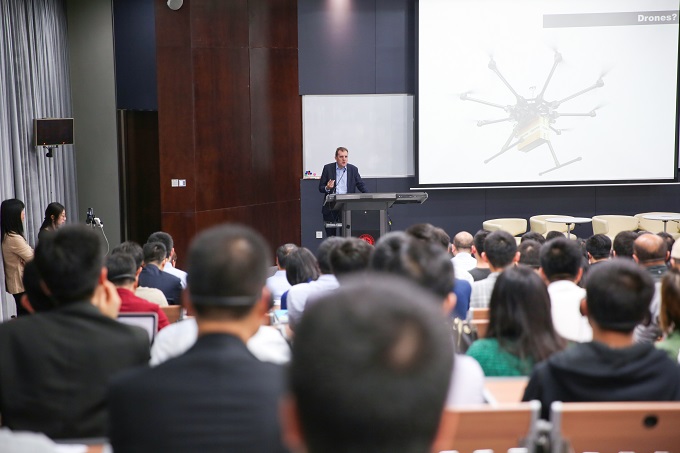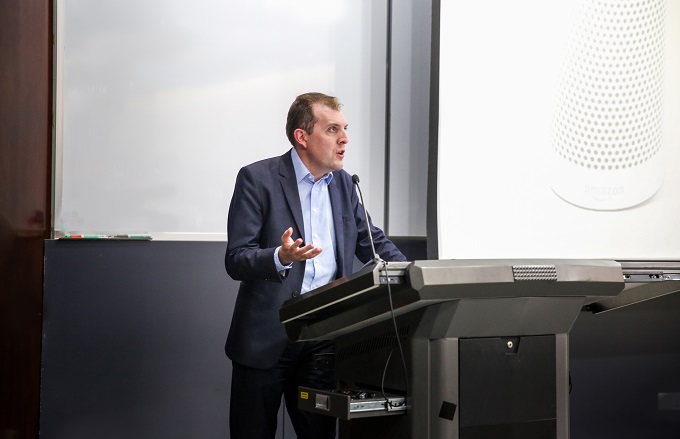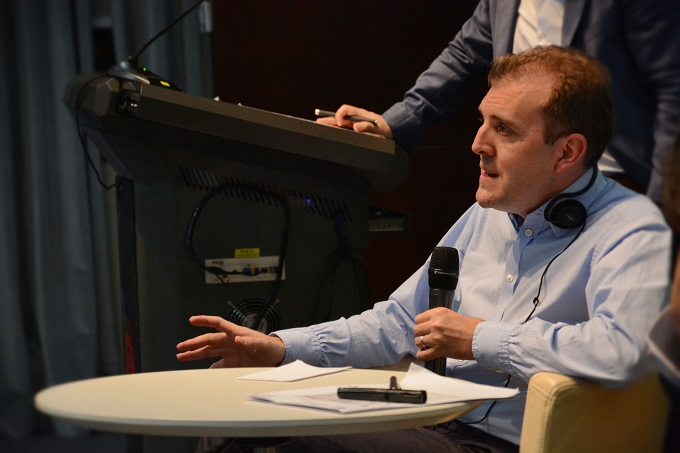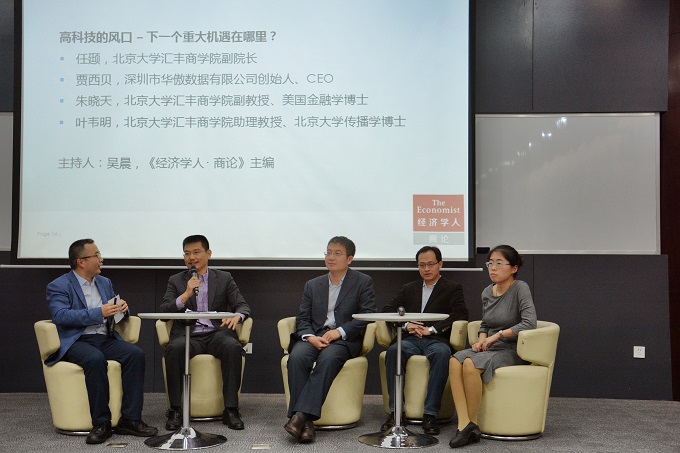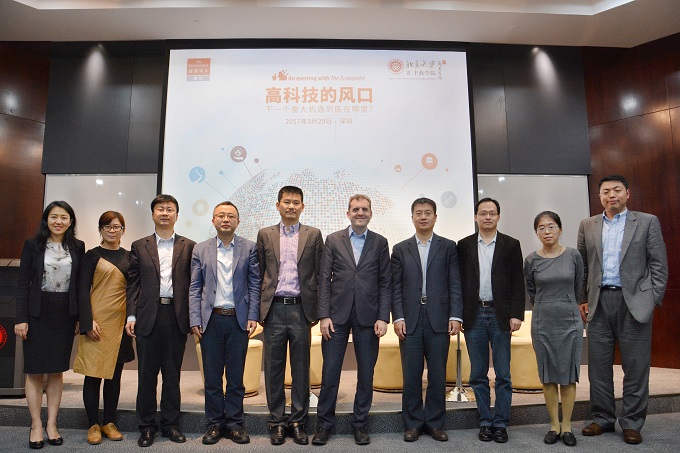The past two years have seen the rise of artificial intelligence (AI) and machine learning taking the public attention by storm. Technology breakthroughs, such as AI, virtual reality and reusable rockets, have seemed to be on the lips of many chief technology officers. Even for money managers attempting to navigate the chaos of financial markets, the application of financial technology, or FinTech, sounds enticing.
These are the latest topics we are reading about, and these technologies have the potential to soon change our lives. Startups worldwide are receiving millions to finance these innovations. But it’s still a big gamble. Who knows what will be the “next big thing”?
To give us a flavor of things to come, Tom Standage recently shared his insights during a presentation for students and faculty at Peking University HSBC Business School (PHBS). A graduate of Oxford University, Standage has worked as the deputy editor at The Economist and has published a collection of articles and surveys from The Economist and six books. “There is a connection between us, as The Economist trying to explain things, while the business school endeavors to understand the world and spot opportunities,” Standage commented in his opening remarks. He then elaborated on six high-tech breakthroughs that may be the next big thing.
Tom Standage shared his insights on six high-tech breakthroughs at PHBS
1. Self-driving cars. Standage said that self-driving cars are no longer a futuristic idea but a current trend. Traditional automobile makers like Mercedes, BMW, and Tesla have already released self-driving features, and tech giants like Google and Baidu are also investing heavily in this field. “It’s a really disrupted technology, but people are thinking about it in a relatively narrow way,” Standage said. He pointed out that self-driving cars can be used in large cities to improve the traffic conditions and reduce car accidents and concluded that “instead of buying self-driving cars, I think we’ll use apps to share self-driving cars as a means of public transportation.”
2. Conversational interface. Instead of typing in a command on your mobile device or computer, people will be doing it with voice command, and Standage said it will change your daily life. “It’s a bit like Harry Potter casting a magic spell. You can give conversational orders and get things done.” Standage then explained conversational interface by describing how he and his wife use conversational interface apps to turn on music, check bank balances and book tickets. For example, last December Facebook CEO Mark Zuckerberg showed off his smart home voice-controlled AI on his phone to dim his lights, play songs and see who's at the door.
3. Drones. Drones are gaining importance in business as a flying sense platform, able to sense and respond to their local environment, and altering their height and flying trajectory in order to avoid colliding with other objects in their path. Standage argued that by collecting data and building models, drones can be used widely in mining, agriculture and construction, far beyond just making deliveries. The Economist also predicted last year that the technology is sufficiently advanced that there is nothing to stop passenger drones taking to the air. It holds that although convincing officials of that could take a few years, a passenger drone is possible.
4. Augmented reality (AR). Standage commented, “Unlike a glorified version of virtual reality that is like video games taking you to another world, AR is potentially the next computer interface that allows you to use the whole world,” since the information about the surrounding real world of the AR user becomes interactive and digitally manipulatable. For example, AR helmets or eyeglasses for surgeons can display a live view of patient monitoring data or real-time operation conditions. Last year, Touch Surgery, the leading mobile surgical simulation platform, even launched a new surgical training AR-driven device, enabling surgeons to perform next to ‘real life’ surgical procedures.
5. Data-driven medicine. Already, many wearable devices can monitor our health data, such as heart rate, calories and blood pressure, and the data then can be analyzed for an effective diagnosis and treatment plan. But the latest trend is to start looking at genes for data to customize treatment as never before. As an example, Standage said that the National Health Service in Britain has sequenced hundreds of thousands of genes and compared them to look for patterns trying to understand genetic cause of disease.
6. Reusable rockets. Thousands of rockets have flown into space, but not until 2015 when Elon Musk’s SpaceX was launched, did one return like this: it came down upright on a landing pad, steadily firing to control its descent. Standage pointed out that since a reusable rocket can be fueled over and over again, it can make spaceflight become a hundred times cheaper, changing the landscape of the aerospace industry.
Standage takes audience questions
“Which one will I choose to be the next big thing? The answer is none of them, but the answer is also all of them,” Standage concluded. He thinks what all six technologies have in common is that the driving force of their advances is machine learning. The technology revolutions marked by computers, the Internet and smartphones have brought us to a new era, “when AI will soon ripple into all these different fields and changes things.”
Roundtable discussions on the rise of AI
The roundtable discussions that followed featured four guest speakers from different fields of expertise. Professor Ren Ting, PHBS associate dean, provided his insights on AI from the perspective of the labor market and education, probing into the often-raised question of what is the role of AI: cooperative robots or replacement robots? Overall, AI serving as cooperative robots now has a positive effect on the society, but it might serve as a replacement in some fields of work in the future . Jia Xibei, Audaquater CEO, talked about the impact of AI on the development of big data and smart cities.
AI has also made its way into the financial industry and media. Zhu Xiaotian, PHBS associate professor of finance, revealed that AI is replacing traders in financial institutions, and it is better to take AI leverage to improve investment strategies. Ye Weiming, assistant professor of financial journalism, shared her thoughts on how AI can be used to keep track of public opinions.
“With a very board range of applications, AI will transform the world in many positive ways,” concluded Standage in the Q&A session after addressing questions ranging from data collection, AI security and Silicon Valley’s key position in high-tech breakthroughs. He said that offering lectures is also a part of his effort in presenting the positive side of AI to counter balance the negative views on AI that dominate public discussions. “Overall, this is something that should be welcomed not feared. That is the answer to the question what is the next big thing.”
Guest speakers and organizers
By Annie Jin
Edited by Priscilla Young





